May 24, 2025 | 02:58 GMT +7
May 24, 2025 | 02:58 GMT +7
Hotline: 0913.378.918
May 24, 2025 | 02:58 GMT +7
Hotline: 0913.378.918
After a decade of implementing the Party Congress Resolution on agriculture, Son La's agricultural landscape today boasts numerous achievements. These articles serve as a chronicle of the land and the people who have contributed to what many still call the agricultural phenomenon of Son La.
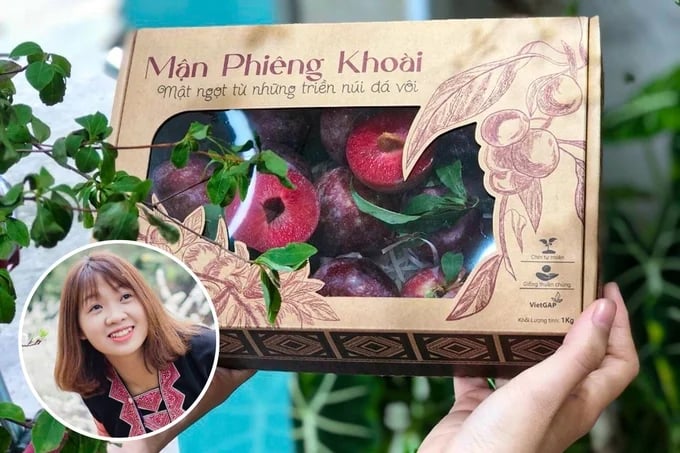
Phieng Khoai plums, sweet treasures from limestone mountains. Photo: Tung Dinh.
Before visiting Phieng Khoai to meet Bui Phuong Thanh, Mr. Ha Nhu Hue, Director of the Department of Agriculture and Rural Development of Son La province, shared with me: "The Noong Pieu Indigenous Agricultural Cooperative, founded by Bui Phuong Thanh, is the first cooperative in Vietnam to export plums to the EU. Recently, 10 tons were exported to European markets such as Germany, England, France, and the Czech Republic."
What makes this story remarkable is that Bui Phuong Thanh, originally from Phieng Khoai and a former high school teacher in Muong La, knew little about agriculture before transforming Noong Pieu into one of Son La province's most successful cooperatives today.
Phieng Khoai is the new name for the border commune of Yen Chau district, Son La province, a highland commune on the Laos border. Its old name, Phieng Khoai, in Thai means "grazing land for cattle". Historically, it was inhabited by Thai, Mong, and Xinh Mun people at an altitude exceeding 1,000 meters above sea level.
In the 1970s, Kinh people from Kim Dong and An Thi of Hung Yen arrived here to cultivate land, establishing tea plantations and raising large livestock alongside local residents. Remnants of challenging times linger in the names of villages and hamlets.
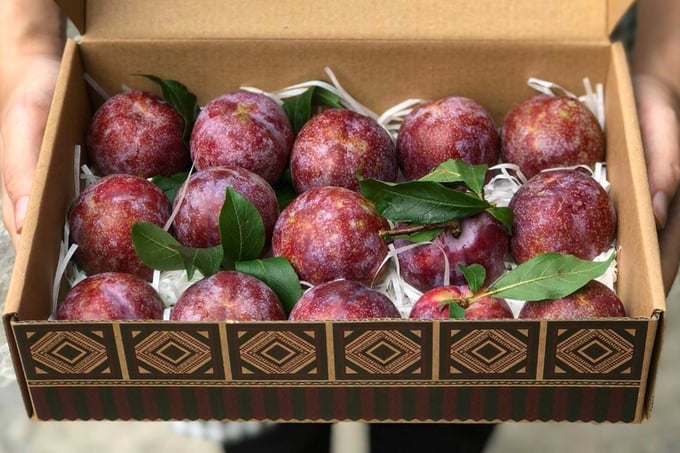
Ruby plums in Phieng Khoai. Photo: Tung Dinh.
For instance, Hang Mon, once a village of the Xinh Mun people, was struck by an unknown disease causing villagers to perish, prompting their relocation and leaving behind a ghostly name. New settlers mispronounced it as Hang Mon, where the Noong Pieu Indigenous Agricultural Cooperative later chose to settle.
From Co Noi Intersection, about twenty kilometers towards Ta Lang, the border highlands of Phieng Khoai unfold with mountains and hills dotted with fruit trees amidst spacious, modern villages. Bui Phuong Thanh attributes this transformation to the proceeds from plum and longan sales, which have replaced poverty with prosperity in Phieng Khoai today. Some families own approximately 500 plum trees, finding joy in their cultivation and effortlessly earning significant profits each year.
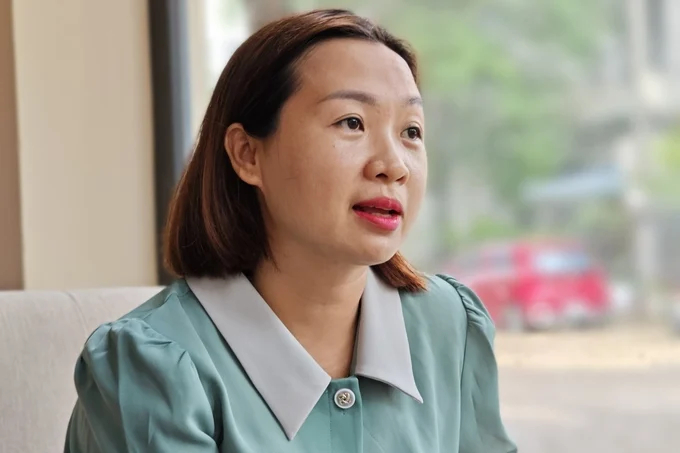
Bui Phuong Thanh, founder of the Noong Pieu Indigenous Agricultural Products Cooperative. Photo: Tung Dinh.
First, a brief introduction to Phieng Khoai plums. Many have long believed this fruit to be a gift bestowed upon the Moc Chau plateau (Son La) or the Bac Ha plateau (Lao Cai), but that's not the case. Fate brought it to Phieng Khoai, a land interspersed with limestone mountains as Thanh mentioned. About 20 years ago, plums were primarily grown here for firewood. Then, one day, whether due to climate change, soil conditions, or changes in cultivation practices, the plum trees on the rocky slopes of Phieng Khoai bore fruit. Not only that, the fruit turned out to be even more delicious than those from Bac Ha or Moc Chau.
However, like many other specialty fruits, Phieng Khoai plums have had their share of challenges and successes. Despite covering an area of over 2,500 hectares, which accounts for one-sixth of Son La's plum cultivation area, the plums in Phieng Khoai aren't always sweet.
"I was born in Phieng Khoai," Thanh's voice softened. "My parents moved from the lowlands to Phieng Khoai to teach. Although I grew up attached to the Thai, Mong, and Xinh Mun communities here - from birth, through school, teaching, and eventually becoming Vice Principal of a high school in Muong La district - I hadn't spent much time with the villagers.
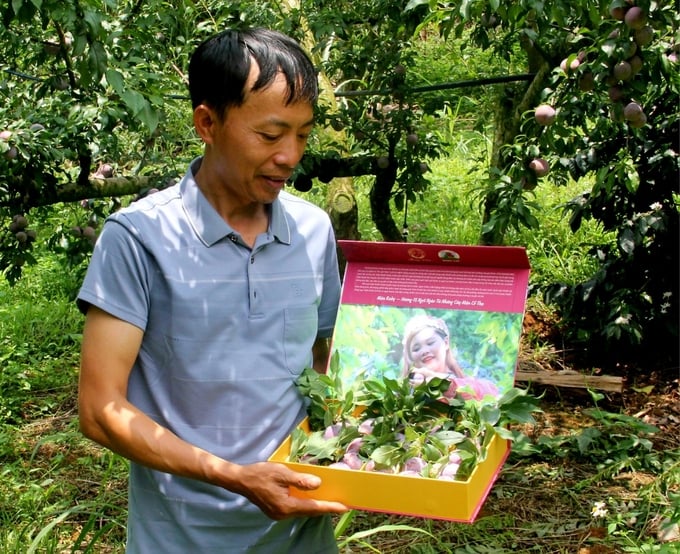
Phieng Khoai farmers promote Ruby plums of Noong Pieu Indigenous Agricultural Cooperative. Photo: Quang Dung.
It wasn't until about 6 - 7 years ago, during plum season, when I returned to my village and witnessed traders entering gardens, driving down prices. They spread tarps under trees, vigorously shaking them to gather fallen fruit. It was heartbreaking. A kilogram fetched only 500 VND. The most beautiful plums were sold for just 1 - 2 thousand VND. My ears flowed freely.”
She thought to herself: Should our villagers continue this cycle of dependence on traders? Should we clear plum trees to plant coffee, only to replant when coffee prices decline? Something had to change for Phieng Khoai plums.
Thinking, researching, learning, the teacher born in 1986 decided to establish the Noong Pieu Indigenous Agricultural Cooperative. Inspired by the Pieu scarf and Com shirt of the Thai people, these symbols represented our startup. Her primary goal: elevate the value of Phieng Khoai plums.
From a teacher accustomed to chalk and blackboards, Bui Phuong Thanh ventured into the realm of agriculture, learned about cooperative activities, mobilized villagers to revolutionize production processes, and sought out new markets. It took several years to find a viable path forward.
Her resolve was clear: Phieng Khoai plums must excel in flavor, captivate even the most discerning customers, and aim for the export market. The first step was to craft a compelling narrative about Phieng Khoai plums.
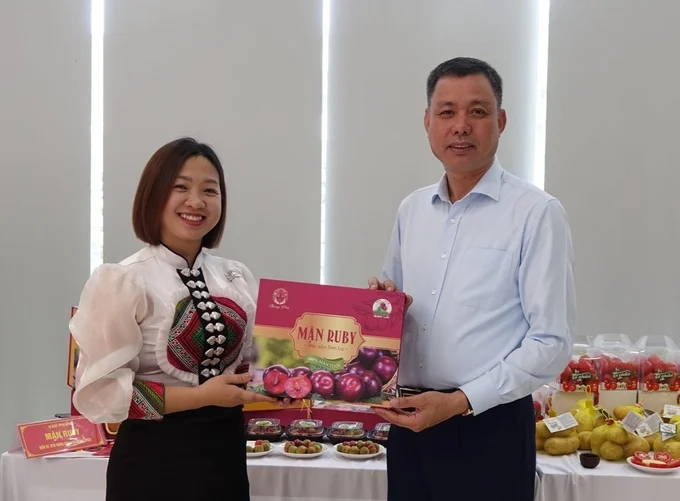
Mr. Nguyen Thanh Cong, Vice Chairman of Son La Provincial People's Committee, and Bui Phuong Thanh introduce and promote Ruby Phieng Khoai plum. Photo: Tung Dinh.
In 2021, when Son La province launched a cooperative project aimed at increasing the value of agricultural products, with a special focus on fruits, Bui Phuong Thanh and her team successfully established a plum model in Phieng Khoai that consistently commands the highest prices in the market. These plums are meticulously cultivated to achieve a weight of 14-16 fruits per kilogram, a stark contrast to the typical 60-70 fruits per kilogram. They boast a thicker, whiter powdery skin that, when rubbed, reveals a gradual transition from powder to a deep red hue, akin to the color of an expensive ruby.
These plums are no different from the pricey imported fruits that Vietnamese consumers often splurge on. Each Ruby plum reaching the customer comes with traceability information such as origin, growing area code, production process details, and an accompanying narrative.
Bui Phuong Thanh proudly displayed the box containing the cooperative's premium product, typically fetching 250,000 VND per kilogram. Emblazoned on the box is the story that Thanh and Noong Pieu wish to convey.
In essence, the Noong Pieu Indigenous Agricultural Cooperative, whose name translates to "Little Sister Pieu," cultivates Ruby plums on limestone mountains, employing advanced agricultural science and technology in their cultivation and harvesting processes. These Ruby plums are nurtured with care and dedication by farmers who ensure each plum is harvested at the peak of perfection.
This meticulous care preserves the plums' natural sweetness, distinct aroma, vivid red color, and dense white powder, imparting a unique and unmistakable allure. Each plum embodies not just a fruit but also the passion and narrative of the people behind this exceptional product.
Bui Phuong Thanh remarked that this is just the beginning. Although "Little Sister Pieu" was the first to supply Phieng Khoai plums for Vietnam Airlines' inflight meals, the first to host sales days on e-commerce platforms, and the first to elevate Ruby plums to 4-star OCOP (One Commune One Product) standards, she is also the first to export...
Reflecting on the achievement of the Noong Pieu Indigenous Agricultural Cooperative, which was the first to export 10 tons of Phieng Khoai plums to the EU market, Bui Phuong Thanh shared that this accomplishment was her greatest ambition. The value of Phieng Khoai plums must conquer the most demanding markets abroad before returning to win over Vietnamese consumers. This path, she believes, will bring greater prosperity to the plum-growing community in Son La.
According to agricultural statistics, Son La province currently cultivates approximately 12,500 hectares of plum orchards, yielding over 81,000 tons annually. The production is primarily concentrated in areas such as Yen Chau, Moc Chau, Van Ho, Son La city, and Mai Son.
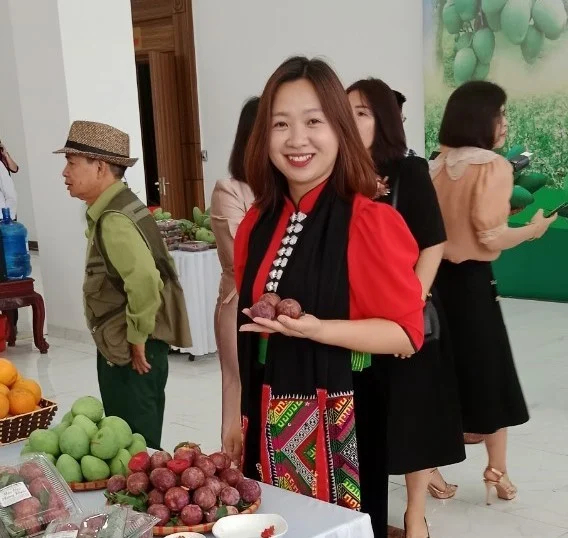
The storyteller of Phieng Khoai plums. Photo: Tung Dinh.
"Little Sister Pieu" always considers the broader impact: "If I were only thinking of myself, I would focus solely on Ruby Phieng Khoai plums. But no, the value of Son La plums must benefit the diverse ethnic communities across Son La province," Thanh emphasized before the 4-star OCOP product evaluation council chaired by Vice Chairman Nguyen Thanh Cong of the Son La Provincial People's Committee.
Following the EU market, the Noong Pieu Indigenous Agricultural Cooperative's next ambition is to enter markets in China, Korea, Japan, and beyond. Initial product samples sent there have received exceptionally positive feedback. Bui Phuong Thanh and her team continue to pioneer new stories about sourcing areas and market standards.
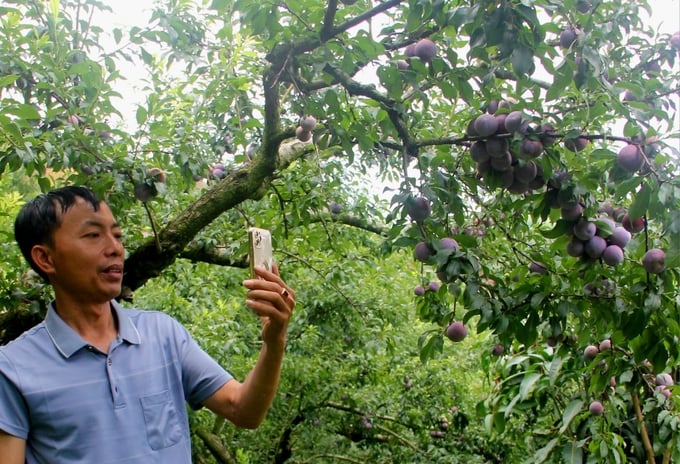
Live stream to sell plums online. Photo: Quang Dung.
In 2021, the Noong Pieu Indigenous Agricultural Products Cooperative successfully established a designated growing area covering 30.5 hectares, with an additional 150 hectares in associated areas, including 12 hectares transitioning to organic farming. Son La province has also planned the Phieng Khoai plum area to become its first high-tech production zone for Ruby plums.
Every day, plum growers from Moc Chau, Yen Chau, Mai Son, and various other regions visit Phieng Khoai to learn about production processes, online sales strategies, and meeting market standards. Bui Phuong Thanh generously shares her knowledge, driven by passion and dedication.
The petite woman's aspiration is for the Ruby plum sourcing area in Son La to expand further. She advocates for high-tech farming methods, seasonal production techniques, and technical solutions for Ruby plums originating from areas like Moc Chau, Mai Son, and other plum-growing regions.
Translated by Quynh Chi

(VAN) The People's Committee of Tra Vinh province has approved an adjustment to the investment policy for the Green Hydrogen Plant project, increasing its area to approximately 52.76 hectares.
![Reducing emissions from rice fields: [2] Farmers’ commitment to the soil](https://t.ex-cdn.com/nongnghiepmoitruong.vn/608w/files/news/2025/05/05/dsc08881jpg-nongnghiep-140632.jpg)
(VAN) Clean rice cultivation model in Thuong Tan commune, Bac Tan Uyen district, is assisting local residents in achieving sustainable agriculture by substantially reducing costs, increasing productivity, and protecting the environment.

(VAN) At the conference to disseminate Resolution No. 68, AgriS introduced its digital agricultural ecosystem and reaffirmed its commitment to accompanying the Government in promoting private sector development and sustainable agriculture.

(VAN) 'Blue Ocean - Blue Foods' initiative is designed to restore marine ecosystems and establish sustainable livelihoods for local communities by cultivating a minimum of 1,000 hectares of cottonii seaweed in the first three years.
/2025/05/21/4642-3-112707_603.jpg)
(VAN) The V-SCOPE project has made direct contributions to three out of six pillars of the Comprehensive Strategic Partnership between Vietnam and Australia.

(VAN) Facing the threat of rabies spreading to the community, Gia Lai province urgently carries out measures to vaccinate dogs and cats on a large scale.

(VAN) Disease-free livestock farming not only protects livestock herds but also stabilizes production and livelihoods for many farmers in Tuyen Quang.